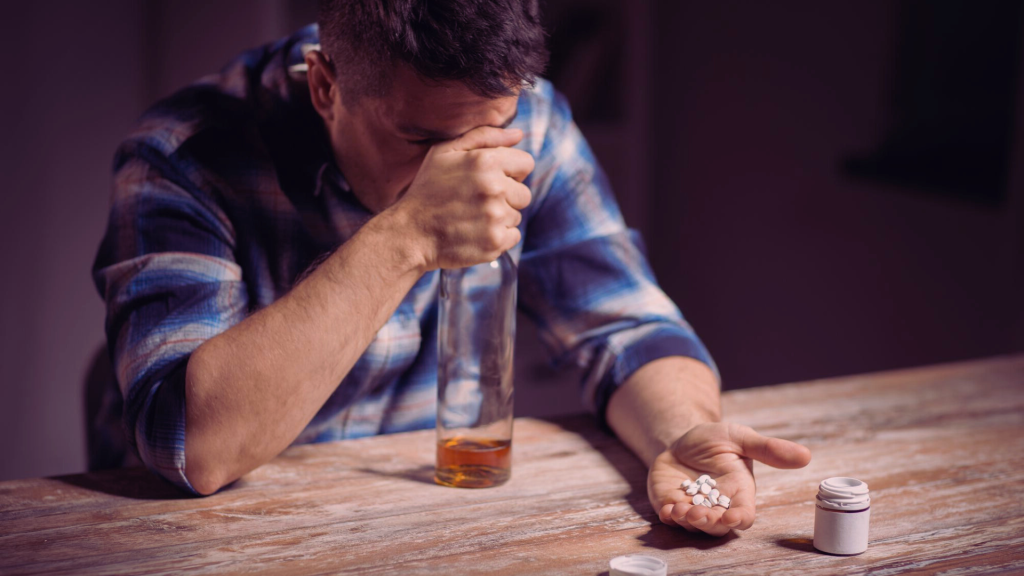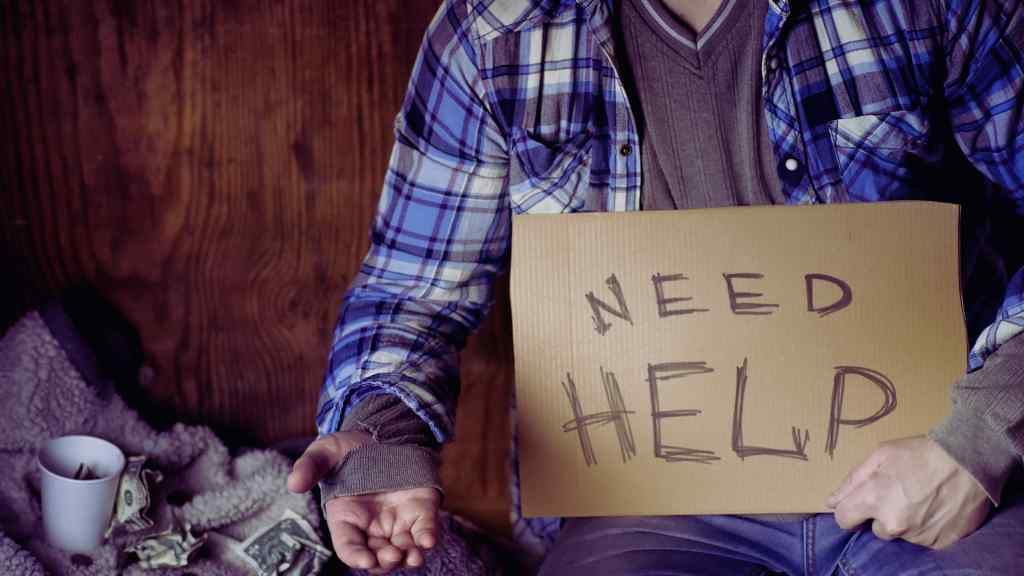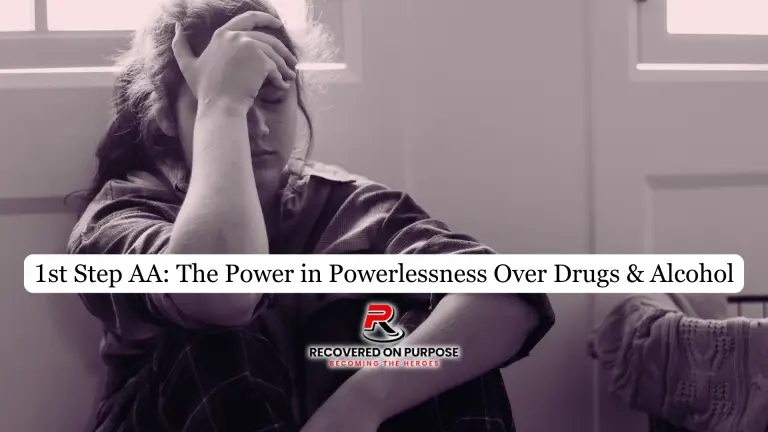Admitting powerlessness over alcohol and other drugs is the crucial starting point for those beginning their journey in Alcoholics Anonymous (AA) or similar recovery programs. The 1st Step of AA from the Big Book acknowledges that we are powerless over drugs and alcohol and our addiction has made life unmanageable, offering hope through support systems, twelve-step recovery work, and a connection to a higher power for a fulfilling and lasting life in recovery.
Introduction to the 1st Step of AA
The 1st Step of AA is the foundation of our recovery process, marking the beginning of our journey toward freedom from drug and alcohol addiction. When, “We admitted we were powerless over alcohol—that our lives had become unmanageable,” we acknowledge the grip of addiction and open the door for a new way to live. This step is not about weakness but about accepting the truth about our disease of addiction and alcoholism so we can begin to break free from the cycle.
Why the 1st Step AA Matters in the Twelve Steps
The 1st Step matters because it sets the tone for the entire twelve-step recovery process. Without admitting powerlessness, the rest of the program cannot be fully embraced. This step is essential for breaking the illusion of control that somehow, someday, we will be able to drink or drug like normal people without losing control. We have to realize the truth that we can never use alcohol or drugs in any form again. For almost all of us, this is the moment when hope begins to replace despair, creating a foundation for meaningful change.
Overview of the Big Book’s Teachings on Substance Abuse
The Big Book of Alcoholics Anonymous emphasizes the unique challenges we face in dealing with alcohol use disorder and substance abuse. It describes addiction as a disease, characterized by the phenomenon of craving and the mental obsession that make abstinence nearly impossible without a spiritual solution. These teachings help us understand why willpower alone is insufficient and why surrender is the first step toward recovery.
By outlining the unmanageability caused by substance use, the Big Book illustrates how addiction impacts our lives, relationships, and sense of identity. It highlights that this step is not just about admitting a problem but about recognizing the need for a support system and a structured recovery program.
The 1st Step of AA is a powerful reminder that admitting powerlessness is not the end—it’s the beginning of our fulfilling life in recovery. It invites us to break free from the chains of addiction and embrace a journey of hope, healing, and transformation.
Defining Powerlessness in Alcoholics Anonymous

The concept of powerlessness in Alcoholics Anonymous (AA) is at the heart of the 1st Step and a transformative realization in twelve-step recovery. Admitting we are powerless over alcohol and other drugs means recognizing that our lives are no longer manageable under the control of addiction. This acknowledgment is the key to breaking free from substance use disorders and beginning a recovery program that offers hope and healing.
What Powerlessness Truly Means
Powerlessness doesn’t mean we are incapable in every area of life; it means we cannot control our alcohol use disorder or addictive behaviors on our own. For many of us, this is a hard truth to accept because it challenges our pride and the illusion of control. However, admitting powerlessness allows us to start rebuilding a life free from the chaos of alcohol addiction and substance abuse.
Dispelling Misconceptions About the 1st Step
Some people mistakenly view the 1st Step as a sign of being weak-willed or failing to overcome addiction through sheer determination. The truth is, addiction is a disease—not a moral failing or lack of effort. This step is about taking responsibility for our lives, recognizing the need for help, and committing to a recovery program.
Powerlessness Is Not Weakness
Acknowledging our powerlessness is an act of courage, not weakness. It opens the door to personal growth and shows us that asking for help is a strength, not a flaw.
The Role of Acceptance in Recovery
Acceptance is the turning point where we stop fighting a losing battle and start building a fulfilling life. By accepting our powerlessness, we align ourselves with a recovery program and support groups, laying the groundwork for transformation and lasting freedom.
The Phenomenon of Craving

The phenomenon of craving is central to understanding why addiction is more than just a bad habit—it’s a disease. As explained in the Big Book of Alcoholics Anonymous, this physical allergy makes it impossible for us to use alcohol or drugs in moderation. Once we take the first drink or drug, a chemical reaction triggers an uncontrollable desire for more. This reaction is unique to those of us struggling with substance use disorders, setting us apart from people who can casually use without consequence.
Understanding Addiction as a Physical Allergy
Addiction as a physical allergy means our bodies react abnormally to substances like alcohol and other drugs. This reaction isn’t something we can will away or control. For those of us with alcohol use disorder or substance abuse issues, even one drink can ignite the craving that drives us deeper into addiction. The allergy makes it impossible for us to drink like “normal” people, no matter how hard we try.
How Craving Distinguishes Alcohol Abuse from Casual Use
This phenomenon explains why casual drinkers can stop after one or two drinks, while we spiral into destructive behavior. Craving leads to compulsive actions—missing appointments, destroying relationships, and putting everything on the line just to feel the ease and comfort of using again.
The Role of the Big Book in Explaining Craving
The Big Book describes craving as a defining characteristic of addiction. It teaches us that this physical response is beyond our control, making abstinence and recovery essential for reclaiming our lives.
The Mental Obsession of Addiction
The mental obsession of addiction is what keeps us trapped, even when we’re not actively drinking or using drugs. It’s an all-consuming fixation that overrides logic, consequences, and even our deepest desires to stop. In substance abuse recovery, we learn that addiction is not just a physical issue but a relentless mental battle. This obsession convinces us that we can control our drinking or using, despite countless failures and consequences.
Why Logic Fails in Substance Abuse Recovery
For most people, logic is enough to avoid harmful behaviors. But for those of us struggling with alcohol addiction or other substance use disorders, logic fails to break the cycle. No matter how many times we tell ourselves, “This time will be different,” the mental obsession drives us back to the same destructive patterns. This is why step recovery begins with the 1st Step—admitting we are powerless and need help beyond our own reasoning.
The Jaywalker Analogy: A Mental Obsession Illustrated
The Big Book uses the story of a jaywalker to illustrate how mental obsession works. Like the jaywalker who repeatedly steps into traffic despite severe injuries, we continue drinking or using, unable to stop. This story reveals the insanity of addiction and how it hijacks our ability to make rational decisions.
How the Twelve Steps Begin to Break the Cycle
The twelve steps provide a spiritual solution to break free from this obsession. By working the steps, we gain the tools to overcome the relentless thoughts of using, creating space for hope, clarity, and a fulfilling life in recovery.
The 1st Step Experience: A Turning Point

The 1st Step of AA is more than a statement—it’s a transformative experience that marks the turning point in our recovery journey. Admitting we are powerless over alcohol and other drugs, and that our lives had become unmanageable, allows us to confront the reality of addiction. This realization forces us to face the truth: our disease has taken control, and no amount of willpower or effort can break its grip. For many, this moment is both painful and liberating, setting the stage for a new beginning.
Recognizing Unmanageability in Life
Unmanageability isn’t just about chaos—it’s about realizing that our drinking, drug use, and addictive behavior have destroyed relationships, damaged our health, and taken over our identity. Whether we’re a single mother struggling to keep secrets from loved ones or someone with a nice home masking alcohol use disorder, we reach a point where life feels pretty manageable on the outside, but inside, it’s far from it. The 1st Step forces us to admit that we’ve lost control.
Personal Stories of Surrender and Hope
For most people, surrender doesn’t come easily. It often takes painful experiences—failed attempts at control, broken relationships, or hitting rock bottom—to admit we are powerless. In my own journey, I reached a moment of deep surrender in the driver’s seat of a borrowed car, realizing that nothing I had tried could break the cycle of addiction. That moment of honesty opened the door to hope and the willingness to embrace recovery.
The Painful Lessons That Lead to Acceptance
Admitting powerlessness isn’t giving up—it’s accepting that we cannot fight addiction alone. The 1st Step invites us to stop struggling and start building a new life through a recovery program. By letting go of control and seeking help from a higher power, we transform pain into growth, and despair into a fulfilling life in recovery.
Spiritual Solutions for Alcohol and Drug Addiction
The 1st Step of AA is more than just admitting we are powerless—it’s the key that opens the door to spiritual healing. For those of us struggling with alcohol addiction or substance use disorders, the 1st Step marks the moment we let go of our attempts to control the uncontrollable. When we admit that our lives are no longer manageable, we become willing to seek solutions beyond ourselves, laying the groundwork for a profound spiritual awakening.
Why the 1st Step Opens the Door to Healing
The 1st Step is the foundation for all spiritual solutions in twelve-step recovery. It forces us to confront the reality that willpower alone cannot fix our addiction. By acknowledging our inability to manage our lives, we become open to new possibilities—especially the idea of relying on a power greater than ourselves. This step is the beginning of a journey that transforms our relationship with ourselves, others, and the world.
Seeking Help from a Higher Power
Alcoholics Anonymous teaches us to turn to a higher power, however we define it, for strength and guidance. This isn’t about religious beliefs; it’s about finding a source of hope greater than our addiction. Whether through AA meetings, support groups like Al-Anon, or personal practices, connecting with a higher power brings clarity and peace, breaking the cycle of addiction.
Spiritual Awakening Through the Twelve Steps
The twelve steps guide us toward a spiritual awakening that reshapes our lives. By working the steps, we begin to heal from the disease of addiction, discover our purpose, and experience the freedom of living without alcohol or other drugs. This awakening is the turning point that leads to true recovery and the ability to build a fulfilling life rooted in hope and connection.
The Role of Community in the 1st Step
The 1st Step is a deeply personal moment of surrender, but it’s not one we take alone. The community we find in Alcoholics Anonymous (AA) plays a vital role in helping us admit we are powerless over alcohol and begin the journey to recovery. When we attend an AA meeting, we discover a fellowship of people who understand the struggles we face and offer strength through shared experiences. This sense of belonging is critical in rebuilding a person’s life and reclaiming a person’s identity beyond addiction.
How Fellowship in Alcoholics Anonymous Provides Strength
The power of fellowship lies in its ability to create a safe space where we don’t feel judged but understood. In these meetings, we meet people who have walked the same road and found freedom. They interpret Step 1 not as a sign of defeat but as the first step toward a new life. Through their stories, we learn that recovery is possible and that the strength of the group can carry us through our weakest moments.
Sharing Stories to Overcome Alcohol Abuse
When we share our experiences in AA meetings, we begin to describe people like us—those who have struggled with alcohol abuse and found hope. Sharing removes the shame that keeps us isolated and opens the door to healing. It’s through these stories that we see the path forward.
The Power of Hearing “Me Too”
Hearing someone say, “Me too,” is one of the most profound moments in recovery. It reminds us we’re not alone and gives us the courage to take the first step. This connection transforms shame into hope and isolation into community, showing us that together, we can overcome addiction and build a fulfilling life.
Practical Tools for Practicing the 1st Step
Practicing the 1st Step of AA requires daily commitment and tools to stay grounded in the reality of our powerlessness over addiction. Developing daily habits like prayer, meditation, or attending an AA meeting helps us embrace powerlessness while staying connected to our recovery program. Staying honest about substance abuse is another critical habit, as keeping secrets can lead us back into addictive behavior.
Daily Habits for Embracing Powerlessness
Incorporating daily reflections or step recovery readings into our routines helps remind us of our commitment to living free from alcohol and drugs. These habits reinforce that admitting powerlessness isn’t about weakness—it’s about choosing a fulfilling life.
How to Stay Honest About Substance Abuse
Honesty is vital. By openly discussing struggles with a sponsor or support system, we address challenges before they become unmanageable.
Journaling as a Tool for Self-Reflection
Journaling allows us to reflect on moments of temptation, unmanageability, and progress. This practice keeps us mindful of our journey and reinforces our commitment to the twelve steps. Try making a list of experiences in your life where you notice the phenomenon of craving and another list where you experienced the mental obsession that caused you to drink or drug.
The 1st Step Beyond Alcohol and Drugs
The 1st Step isn’t just about admitting we were powerless over alcohol or drugs—it’s about learning how to apply this principle to broader challenges in our lives. Whether it’s dealing with romantic partners, a loved one’s drinking, or overwhelming life struggles, powerlessness teaches us to let go of control and focus on what we can change. Almost every newcomer to recovery discovers that the lessons of the first step extend far beyond substance abuse.
Applying Powerlessness to Broader Life Challenges
When individuals struggling with addiction admit they are powerless, they also start to recognize the areas in their lives where surrender can bring peace. This mindset allows us to navigate challenges with clarity and purpose.
Building a New Life Through the Twelve Steps
A successful first step lays the foundation for a fulfilling life. The twelve steps guide us to grow spiritually, rebuild relationships, and rediscover our purpose.
From Hopelessness to Empowerment
Admitting we were powerless doesn’t leave us hopeless—it empowers us to transform. By embracing the first step, we go from feeling defeated to building a life filled with hope, love, and strength.
Final Encouragement for Those Taking Their First Step
Taking the first step as an alcoholic is the most courageous act in recovery. Admitting we are powerless over alcoholism and the disease of addiction opens the door to healing and hope. AA reminds us that we are not alone, and working Step 1 is the foundation for lasting change. Embrace this moment, knowing it’s not a sign of weakness but a step toward a life of freedom, purpose, and fulfillment. Recovery is possible.
Adam Vibe Gunton is an American author, speaker and thought leader in addiction treatment and recovery. After overcoming homelessness and drug addiction, Adam found his life’s purpose in helping addicts find the same freedom he found. As Founder and Executive Director of the 501(c)3 nonprofit, Recovered On Purpose, and Managing Partner of Behavioral Health Partners, Adam has helped thousands find freedom from addiction all over the world.
